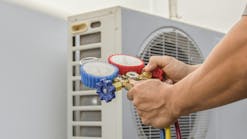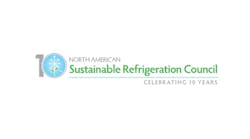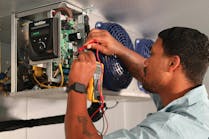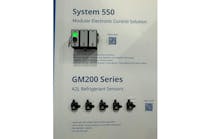In our February issue (CB, Feb., p. 46) we reviewed the workings and ramifications of extended warranties as they apply to residential HVAC systems. This month, we look at similar considerations related to commercial refrigeration systems and components.
The growing use of new, increased efficieny refrigeration equipment should motivate contractors to explore all available warranty options. Ray Clarke, director of business development for Heatcraft Refrigeration Products, Stone Mountain, GA, says higher efficiency equipment gives contractors opportunities to sell replacement products, and offer extended warranties on those products.
“The customer may not be fully confident in how it’s going to perform, and an extended warranty gives them the assurance that they’ll not have to deal with any replacement costs,” Clarke says.
“For example, electronically commutated (EC) motors are very efficient, but they’re also considerably more expensive than standard shaded pole motors. An extended warranty brings peace of mind that the replacement cost won’t pose a problem to their budgets. The higher efficient equipment will save money due to a favorable payback, and the extended warranty will save money by avoiding costs due to unplanned breakdowns that might occur after the standard warranty period ends.
“Bottom line, any time a contractor can get in front of a customer, it’s an opportunity to show value,” Clarke says.
Greater Customer Payback from Reduced Operating Costs
Kevin Chunn, Heatcraft director of marketing, adds that customers who purchase increased efficiency equipment are making a significant upfront investment that will help reduce operating costs over the life of the equipment. Maintenance, however, is key to getting the most out of the purchase.
“The higher efficiency equipment needs to be maintained properly over time in order to continue achieving maximum savings from reduced operating costs,” Chunn says. “Since customers will be likely to want to protect both their initial investment and to help make sure their equipment is always operating at peak performance, contractors will have the ability to sell value added services such as extended service agreements and extended warranties.”
Peter Dikeos, senior vice president of operations for Equiguard, a provider of extended warranties and service agreements for the HVAC industry, agrees that the initial first cost of green equipment could motivate customers to purchase extended warranties from refrigeration contractors.
“The market hasn’t caught up yet in terms of competitive pricing for the newer refrigerants and equipment, so, certainly, if a piece of green equipment fails, it will be more expensive to repair,” Dikeos says. “And, since the refrigerant recovery rules were established, there’s now a charge incurred with the refrigerant recovery. I think the industry will eventually arrive at competitive pricing for equipment, however the recovery charge will always be there.
“Therefore, the more a customer spends on any single purchase, the more likely they are to purchase an extended warranty.”
Contractors More Aware
Cliff Grenon, lead service technician, Laconia Refrigeration Co., Laconia, NH, says warranties are standard issue on the company’s new equipment sales.
“If the factory warranty on the compressor is one year, we buy a five-year,” Grenon says, in consideration of the peace of mind the extra coverage brings.
Does equipment with a higher price tag always inspire customers to go with a warranty? Grenon says no, due to the realities of some business climates. “Usually, restaurants want the cheapest we can find, because many restaurants are hurting for business,” Grenon says.
Nevertheless, he now installs nothing but the most efficient equipment, as a matter of expediency. “You can’t buy the lower efficiency equipment. Once they sell out the older models, that’s it,” he says.
Ron McKuen, president, Cold Control, Wichita, KS, relies solely on the coverage provided by most factory warranties (one-three years on parts, five years on compressors).
“However, on new coolers, we offer an extended compressor warranty. For the rest of it, if the system’s maintained right, it’s like a warranty at Best Buy; I don’t buy them. I stress the importance of preventive maintenance, but if things get tighter, people aren’t going to want to spend any money until it’s broken.”
Servicing Contractors Often in a Pinch
Mark Kelley, warranty administrator for Atlanta Refrigeration, Atlanta, GA, says warranty coverage of existing equipment can be a grey area for servicing contractors and customers who have no knowledge of warranty provisions.
“Some manufacturers automatically offer a five-year warranty on their compressors, and some don’t,” Kelley says. “It’s really up to the selling agent to explain it. Servicing contractors are familiar with many manufacturers’ warranties beyond the basic coverage, however, as a servicing agent, we have no knowledge of what type of warranty was sold to the customer originally. All we hear is, ‘my equipment’s broken and I have a warranty.’
“Unfortunately, servicing contractors learn the hard way — by either a factory rejection of a claim, or by the customers’ unfamiliarity or misunderstanding of the warranty provisions.”
Kelley says Atlanta Refrigeration does all it can to help customers understand warranty language.
“When a customer is misinformed, his final repair can sometimes be delayed while service billing clarification is verified. This protects the customer as well as the service agent,” Kelley says.
Atlanta Refrigeration stresses the importance of preventive maintenance programs, for a variety of reasons:
- extended equipment life, including compressors
- reduced operating costs
- customers realize a substantial cash savings by preventing a major breakdown
- potential loss of food product is reduced or eliminated
- increased equipment efficiency and productivity
- reduced refrigerant loss
- reduced potential for hazards related to refrigerant leakage.
“Calibration and cleaning filters and fans improve air flow, reduce power needs, and wear and tear on motors and motor components,” Kelley says.
“The PM inspection also draws attention to leaking gaskets and seals, which are related to cooling or heat loss, and any failing parts, or parts that may need to be repaired or replaced in the future.”









